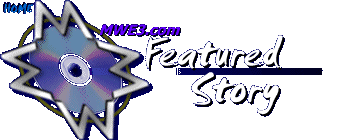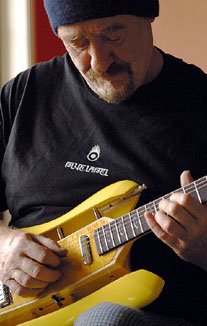 I
Thought You Knew...
I
Thought You Knew...
A
conversation with Dave Mason
by Robert Silverstein
A decade steeped in turmoil and as well one bearing unbelievable human
achievements, the ‘60s were also, fortunately, the most musically
comforting era in recent memory. As great as each year of the ‘60s
was, 1967 was the year that brought 20th Century music to it’s
loftiest heights. Aside from the obvious pop classics like “Penny
Lane”, “All You Need Is Love” and “She’s
A Rainbow”—songs confirming the innovations of the Beatles
and Rolling Stones—one song in particular that stood out during
the Summer of ‘67 was the debut single from Traffic called “Paper
Sun”. Kicking off with the nimble sitar work of Dave Mason, the
Steve Winwood / Jim Capaldi composition amazingly distilled a number
of Beatles-related influences from Revolver and Sgt. Pepper’s
and, coupled with a unique arrangement and flowing, magical hooks,
basically catapulted the four co-founders of Traffic—Steve Winwood,
Chris Wood, Jim Capaldi and Dave Mason—to instant international
acclaim. It’s great to be able to say it...although it’s
now almost 36 years since the Summer of Love, Dave Mason is still
very much on top of his game, returning in 2003 with a new guitar,
a new solo record and label behind him, tours and an ongoing sense
of just how important his pioneering work with Traffic really was
and still is. For his interview with 20th Century Guitar and mwe3.com
editor Robert Silverstein, Dave was in a great mood, constantly joking
and heartily laughing (while effortlessly getting everybody else to!)
and never taking himself too seriously. Even though it’s been
35 years since the original Traffic lineup recorded together, after
speaking with Dave you really get the feeling that he would like to
be back in the studio again laying down a fresh set rock wonders with
his one time band mates Steve Winwood and Jim Capaldi. With the tragic
passings over the years of fabled Traffic cohorts like the great Chris
Wood—a lynch-pin of the early Traffic sound—original Traffic
producer and Brooklyn native Jimmy Miller, as well as one time Traffic
members Ree-bop and Traffic / Blind Faith founder member Ric Gretch,
you best believe that Winwood, Mason and Capaldi are the torch bearers
of the Traffic legacy. Although Winwood emerged unscathed from the
Traffic years—earning Grammies, deservedly so for his well crafted
pop songs—for many of Traffic’s original fans, the essence
of Traffic’s magic was never fully recaptured after 1969's Last
Exit, despite the band’s trendsetting albums during the post-Mason
years, ‘69-75. As important as Mason’s contributions are
to the Mr. Fantasy album, his 1970 solo debut, Alone Together
still remains his benchmark work and overall most popular album.
Certified Mason classics like “World In Changes” and “Look
At You, Look At Me” have worn well with time, aging like a fine
wine. For a good example of just how well the Alone Together songs
still sound, check out Dave’s 2002 DVD on Image Entertainment
called Dave Mason Live At Sunrise. Recorded live in Ft.
Lauderdale, the 2002 live set offers a great close-up of Mason entering
the new millennium in style—backed by a tight band of players
who not only get these songs but play them like true fans.
For his interview with mwe3.com founder Robert Silverstein in the
March issue of 20th Century Guitar Magazine, Dave was pretty animated
as he spoke about his early influences as well as his fondness and
appreciation of his legendary musical chums like Steve Winwood, George
Harrison and Jimi Hendrix. With a new solo album arriving later in
2003, music fans will be glad to know that Dave Mason has not only
lived to tell us about the ‘60s but is very much still on the
musical frontier, just to remind us what a music legend sounds like...just
for you...
Robert
Silverstein: RS
Dave Mason: DM
RS: Dave, great to meet you after being such a big fan all these years.
I was an early Traffic fan who had the original UA release of Mr.
Fantasy when it came out late in ‘67.
DM: The one they took my picture off. (laughter)
RS:
I used to carry the album around my neighborhood for a while I was
13 or 14. On the reissue of the 2000 CD reissue of the U.S. version
of Mr. Fantasy they did put a picture of you on American version.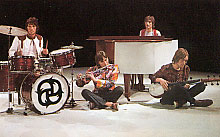
DM:
They oughta put me in somewhere ‘cause I wrote half the album!
(laughter) But I was just an invited guest. (laughter)
RS:
I hear you had a part in engineering a new Dave Mason guitar which
you’ve brought with you?
DM:
It’s an RKS guitar, which is an industrial design company out
in California, in Thousand Oaks. They started designing this...when
did they start designing this? (Dave is speaking to Ramesh Sawhney,
owner of Blue Records, also in attendance and at who’s house
the interview took place) It was over two years ago, wasn’t it?
Anyway, they do industrial design and of course like any place there’s
some young guys in there who are...some guitar freaks, along with
Ramesh’s brother, who’s just a freak (laughter), who owns
the company. They just decided to do it as a sort of part time project
and they started designing it. When I first saw it, it was three quarter
scale and there was no head stock on it. It was kind of like a Steinberger.
Somehow I got involved with it and I was sort of responsible for mostly
designing the head stock. The rest of it was that, first of all three
quarter scale is not going to work. I mean for kids and girls it would
probably be great but for professional guitar player it’s too
small. Basically I was the ‘not yet’ guy.
RS: The not yet guy.
DM: That means...not yet! (laughter) That means, they keep bringing
it and I go, ‘it’s cool, but...not yet’. Take it back
and do this. So I basically would just tweak the whole thing out.
Get the right thing for the neck, obviously. And the idea of the guitar
basically is that their bodies are removable so you can put different
design bodies on it. The plate in the middle section eventually will
be so that if you want to change the pick-up configuration from single
coil to double coil, you can basically take one guitar and you can
accessorize.
RS: (Ramesh Sawhney) What is equally as important is that when RKS
initially came up with the concept of the guitar, RKS was making it
as a model guitar so they could present it and show that it was a
great design. When they brought in a musician, of the caliber of Dave
Mason, it was no longer just a model.
DM:
Well, it had to be a functional, great design.
RS: (Ramesh Sawhney) Well I mean what Dave did is, being one of the
superior recording artists, he was able to take it and actually make
it sound, work and feel the way a guitar should feel and sound to
a musician. So this guitar now is no longer in the league of being
a guitar that you would go out and buy for your kid. This is a guitar
that you will go out and you will play in concert. It’s a professional
tool.
RS: I was reading you were using ESP guitars.
DM: I still have ESP guitars. I have, like anybody, I’ve got
Gibsons, I’ve got ESP, I’ve got Fenders. I have a collection
of guitars.
RS: You used to play a Gibson Explorer as well?
DM: No, Firebirds. I haven’t played the Firebirds for years.
RS: What was your main guitar during the Traffic years?
DM: Mostly a Strat. But actually on a lot of the really early stuff,
Winwood’s playing guitar. I mean, we kind of just did different
things. Especially on the first album, I played bass on stuff. Some
harmonica. Guitar. Mostly it was a Strat.
RS: Any other electric guitars that you’ve had over the years
that you’d like to mention?
DM: Umm...I’ve used so many different guitars. Alot of the time
it depends on what song you’re recording. Like on Alone Together,
on “Look At You, Look At Me” I used a Flying V. On “Shouldn’t
Have Took More Than You Gave” I used a Gretsch Country Gentleman.
So it depends. I use different guitars on different tunes.
RS: You’ve always had such a unique and full-bodied sound to
your guitar playing. How would you describe your guitar sound?
DM: You try to get a tone that’s...appealing. I go more for the
tone. I’m not a flashy guitar player because I’m not technically
that brilliant. It’s just that I’ve found a way to make
simple things sound good. I’m not going to be up there playing
twenty zillion notes when two will do. I mean space is as important
as the notes in music.
RS: Do you remember your first guitar?
DM: My first guitar was a Goya Tone. No, actually it was a Mayfair.
It was forty dollars. Then I got a Goya Tone and then I finally talked
my dad into buying me a Strat. Actually it wasn’t my dad, my
mother. She stole money out of the till of the shop so she could buy
it. (laughter)
RS: You want me to leave that part out?
DM: No, you can put it in! (laughter) They’re all long gone.
(laughter)
RS: I understand you have some newer and more recent songs which haven’t
yet been released.
DM: I mean, I don’t have a lot of stuff. Like most of the albums
that were done, what I finish up writing usually gets recorded. If
I don’t finish it’s because I don’t think the song
is good enough to make it. So, it’s not like I have a whole big
backlog of stuff. I don’t. I mean it took me two years to write
those eight songs on Alone Together. I’m not, I won’t
say extremely prolific, but I try to write stuff that will last a
long time.
RS: So who’s playing with you on the new songs you’ve recorded?
DM: Just session guys. There’s no “name” people on
there at all at the moment. But who knows, there might be. I’ve
got something for Carlos (Santana) to come play on! (laughter) Carmine’s
playing on one thing. Carmine’s playing on “Good To You”.
He mostly plays with Rod Stewart.
RS: Carmine?...
DM: Rojas. Tal Bergman’s on drums. Great drummer. I’ve
got a young kid that I’m working with. Actually I’ve got
one of his songs on the album. Jonathan McKuen, who’s father
started the Nitty Gritty Dirt Band. The kid’s really talented.
He just can’t figure out whether he’s going to be country
and western or rock and roll. (laughter) ‘Cause he’s got
great country chops too. That’s what he grew up around. And then
John Sambataro, who’s playing with me, he used to play with Firefall.
John just came down, actually just to sit in. He hadn’t played
with me for twenty years almost. Richard Campbell’s playing bass.
RS: Richard also does your web site.
DM: Rich is a computer freak. Richard’s more of a journeyman
kind of player. He’s played with me for a long time. He played
a little bit with Three Dog Night. Well I say, One Dog...Night (laughter).
He played with Natalie Cole. And that’s basically it. And there’s
alot of stuff that’s not really finished. We’re cutting
tracks. Mike Finnegan will play Hammond B3 when it’s time to
do that. And then background vocalists, I haven’t gotten to that
part yet, so I don’t know who’s going to be doing that.
I’m still in the throes of finishing this thing.
RS: Live At Sunrise, which was released by Image Entertainment
on CD and DVD is both quite amazing. There’s some timeless
music on there. How did you hook up with Image Entertainment for Live
At Sunrise?
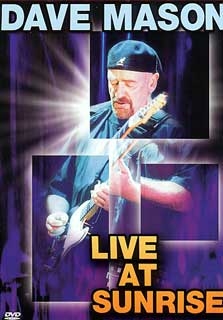 DM:
It was done through, mainly Alan Jacobi who has a label in Miami called
Pyramid. And that’s how this came about. His whole idea was to
do classic artists. It’s what he wanted to do with that label.
Now he’s doing actually what I told him he should have done in
the first place, which is managing young acts.
DM:
It was done through, mainly Alan Jacobi who has a label in Miami called
Pyramid. And that’s how this came about. His whole idea was to
do classic artists. It’s what he wanted to do with that label.
Now he’s doing actually what I told him he should have done in
the first place, which is managing young acts.
RS:
So he was behind the Live At Sunrise CD and DVD?
DM: He made it possible. He’s not really involved in it in any
way, he just made it possible to happen.
RS: I know you’re going back out on the road and are coming
to NYC for a gig at BB Kings.
DM: B.B. Kings on March 6th (2003).
RS:
Like you say on the DVD, it never ends. You must love playing live.
DM: Always playing live. I could do without traveling though. (laughter)
RS: In the liner notes of another great album you recently released
on Sanctuary Records, Jim Capaldi said playing live with you was sort
of like coming full circle. So what was it like playing with Jim on
the Live - The 40,000 Headmen Tour CD?
DM: Actually the whole thing with that was were going to do an album
and we cut a bunch of stuff but we went on the road. It was good,
I mean I’ve known him since I was 15 or 14. He grew up around
ten miles away from me and we were in lots of little bands together.
But, it just got hard. Personally, it just didn’t work out. So
he went back to England. It’s a shame really. It just didn’t
happen. I mean the ideal thing, the smartest thing for any of us to
do would be for me, and Steve and Capaldi to do a reunion album. A
Traffic thing. I mean, if I had a dollar for everybody that asked
me, ‘Is it gonna happen?’, I’d be wealthy. I don’t
know...it just can’t. At this point it just doesn’t seem
to want to work. Which is a shame. But’s it’s too bad they
don’t want to do it. That’s a drag. There’s alot of
bands out there, The Eagles. I mean there’s a lot of guys that’ve
got all kinds of sticks up their butts about each other who can at
least get together on the stage to make some music. We did do one
thing. Steve came when we were at The Bottom Line. Was it two years
ago? About two years ago. Actually George came down. That was the
last time we saw him was at the Bottom Line. But Winwood came down
just for one show and got up on stage and did a couple of songs with
us. I mean the crowd went nuts. I mean just for that reason alone
it would be great to do, in London.
RS: To my ears, both Live At Sunrise and the 40,000 Headmen
CD reaffirms that your songs are just getting better with
time. That must be the timeless quality you were mentioning when you
were describing your songs on the interview of the DVD. “World
In Changes” sounds as powerful today as it did back then. In
addition to featuring a number of Alone Together tracks both
The 40,000 Headmen Tour CD and Live At Sunrise feature
live versions of “Dear Mr. Fantasy”.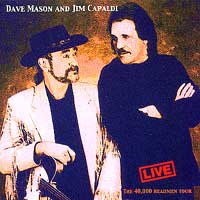
DM: That’s just a fun tune to do live.
RS: Do you still remember playing guitar at Olympic Studios on the
original Traffic version of “Dear Mr. Fantasy”?
DM: That’s Winwood. I’m playing bass and harmonica on that.
RS: Do you remember the guitars you used on the Mr. Fantasy album
or is that going back too far?
DM: (laughter) They’re probably Strats.
RS:
So Steve Winwood played guitar on the Mr. Fantasy album?
DM: Steve played most of the guitar on the early Traffic stuff. And
then the second one came out. I didn’t really start playing anything
worthwhile on guitar until I did Alone Together, actually.
RS: One remaining thing about Steve Winwood. I don’t think he
makes music anymore. (ed. - boy was I wrong! Check out Steve's 2003
album About Time at www.stevewinwood.com)
DM: I don’t know...There’s three people off the top of my
head that I think are the most naturally talented people I’ve
ever worked with and that’s McCartney, Stevie Wonder and Steve
Winwood. Well, they can play anything. They can play drums, play guitar,
play piano, play bass, sing and write. Those are the three people
I know that can actually pull off every aspect of that. In other words,
he’s really talented. Winwood’s an extremely talented guy
and it’s such a waste that he’s just not doing anything
and he’s not doing anything by himself. (uh-oh Dave!)
RS: When was the last time you spoke to him?
DM: At The Bottom Line.
RS: As a long time Traffic fan from the start, I was thinking it’d
be great if, you know you and Steve and Jim could make a really vintage
sounding studio album again. Even break out the sitar and harpsichord
again, just for the fans. What kind of album would you like to make
with them? Anything.
DM: (laughter) Yeah, exactly! It’s sad. He had a lotta success
with The Spencer Davis Group and then he wanted to change. I mean
we were really young then. Let’s see...I was 19 he was 17. Jim
was like the oldest guy in the band. He was like 22, 23 or something.
We just went and locked ourselves away and made music.
RS: Jim’s drumming on the 40,000 Headmen CD is great.
DM: He’s an excellent drummer.
RS: Did you see the mono and stereo reissues of Mr. Fantasy
that came out a couple years ago on UMG?
DM: No.
 RS:
You didn’t see them?
RS:
You didn’t see them?
DM: I don’t even know half the stuff that comes out. (laughter)
You know what? I actually made the first ever stereo single ever in
England. A song called “Little Woman”. In those days it
was called compatible stereo.
RS:
Which do you prefer, the mono or stereo mixes of Mr Fantasy?
DM: You know what? I think you’re gonna have to sit me down
and let me hear both of them side by side. The thing about the whole
thing when we first started getting together was that Steve wanted
to do something new. He was sick and tired of being called the young
Ray Charles in England, which is what his tag was, because you had
a 15, 16 year old kid from Birmingham that sounded like a black kid
(laughter) who could play Hammond. I mean he was The Spencer Davis
Group. And he wanted to do something different and he started Traffic.
(pointing to covers of the first three Traffic CD covers) On that
stuff, that was like the first time I’d ever written. And the
first thing I ever wrote was “Hole In My Shoe”. (pointing
to the second Traffic album cover) And when we started doing this
album, I thought this was like the first time it started to sort of
gel.
RS: Just going back to the Mr. Fantasy album. The song “Paper
Sun”. That’s your sitar playing?
DM: Yeah, and “Hole In My Shoe”.
RS: You played it all through “Paper Sun”?
DM: Well it’s only on that one part (sings intro). Then it stops
when the verse starts.
RS: Are there any guitars on “Paper Sun”?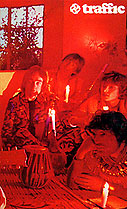
DM: Actually, I can’t remember. (laughter)
RS: The second song on the American version of Mr. Fantasy, “Dealer”
is another Winwood / Capaldi song. Were you singing on that?
DM: I played bass on it.
RS: So that’s Steve and Jim singing on that.
DM:
Yeah.
RS: Also on Mr. Fantasy, the song “Giving To You”
was brilliant. Was that you playing guitar on that? The song that
starts out with the line, ‘but I mean jazz’.
DM: Oh that one! Yeah, that was me playing guitar. That’s Jimmy
Miller saying that.
RS: I was reading “Hole In My Shoe” was based on a dream.
DM: It’s just like a nursery rhyme.
RS: So that was the first song you ever wrote?
DM: Yeah. “Hole In My Shoe” was about the only thing I could
come up with because I had no life experiences. And after I
wrote that I realized y’know if I’m going to write songs,
I need to write songs. And so me personally, I just got into more
of a reality thing.
RS: In the interview on the Live At Sunrise DVD you spoke about
how powerful LSD was during the ‘60s. “Hole In My Shoe”
is a great example of pop psychedelia.
DM: Sure. You know what? I hadn’t even done it when I wrote that
song.
RS: I guess John Lennon had written quite alot of music under the
influence of LSD.
DM: (laughter) It was that time. It was the great quantum leap forward
supposedly. (with Indian accent) How to get there without years
of meditation! (laughter) You know what LSD was synthesized for?
As a cure for schizophrenia. That’s what it’s original use
was for as part of a therapy cure for schizophrenia. Alot of people
were doing that in the ‘30s. Sandoz synthesized it. Salvador
Dali, Walt Disney. Cary Grant used to go to clinics all around the
world and take it. I think I tried it about four or five times. That
was it. I realized what it did. It had a habit of breaking down the
ego, the self. And I got really aware of that. And I never wanted
to do it again after that.
RS: 1968 was a pretty strange year with all the political assassinations
and the Vietnam war going on and all. That must have had a bearing
on things. Any other reflections of 1968?
DM: The Vietnam War wasn’t really part of our lives. We were
just four kids living in a cottage in Berkshire. Actually the biggest
influence on that second album was Big Pink. The Band. After
I first heard that album it was like, whoa!
RS: It seemed like everybody was heading towards that sound. Especially
you and Clapton.
DM: We were the first guys that really—especially Winwood ‘cause
he was very big, I mean he was a big name in England—we were
really the first guys to say, ‘screw it all’. Everybody
wanted to move to London and we said, ‘nah! we don’t want
to be there we want to be in the middle of nowhere and see what happens.’
So we kinda really started that whole...I mean Traffic’s probably
one of the first alternative bands. ‘Cause we were all into jazz,
blues, rock. The problem started to happen because when I started
writing, I wrote alone and they took umbrage to that. (laughter) And
also my songs got picked as all the singles. That was the beginning
of the end.
RS: But I always felt it was the balance in Traffic that made it so
special.
DM: Well the differences are what made it great, isn’t it?
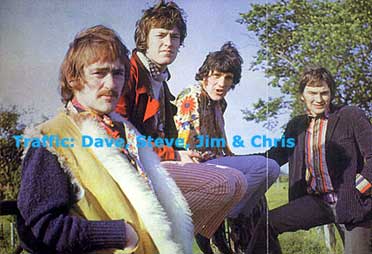
RS:
You had three great singers.
DM: And three different personalities and three different writers.
Differences combine to form beauty and give it some kind of depth.
So if you make the differences work for you, you really come up with
something. The problem is when they can’t get around the personality
differences, and still can’t and that’s why we’re not
doing anything, which is a shame. It’s like everybody’s
carrying stuff they had when they were eighteen years of age and we’re
50 year old men, for God’s sake, with kids. You’d think
you could put that stuff behind you but it doesn’t seem to happen.
RS:
(Dave’s son True is also in attendance and he turns the conversation
to the early Mason-composed Traffic song “You Can All Join In”)
Was “You Can All Join In” as easy to write as it is fun
to listen to?
DM: Well after that first album...I was so young and we got so much
success real quick, in England and I really couldn’t deal with
it. I just couldn’t deal with the success. I couldn’t deal
with the perception of people and the way they changed. We were selling
records (laughter) and we were a great band. But I was really young
and I couldn’t deal it so I left the band which is what I did
after the Mr. Fantasy album. And that second album was basically...“You
Can All Join In” and “Feeling Alright”—I went
to Greece for two weeks to a little island called Hedra with just
a little bag and a guitar and I wrote “Feelin’ Alright”
on Hedra. I started to write “You Can All Join In” on the
day I was coming back home (laughter) which is funny ‘cause I
had no money and I had to call Island Records to get me a ticket to
get out of there! But I wrote “You Can All Join In” sitting
in a sidewalk cafe in Athens. At the time it was one of the most uptight
places I’d ever been in my life. It was, at that point then.
I was English too, so we’d been places and stuff. When you were
walking around you had all these cops with these tri-pointed hats
and submachine guns slung over their shoulders. It was a very uptight
place for me. ‘Cause I was what, 19 or 20 years old? So I wrote
that. “Feelin’ Alright” was an exercise...since I’d
gotten into sitar, “Feelin’ Alright” musically was
just an exercise in writing the simplest possible thing I could come
up with in Western music. It’s just two chords.
RS: Could you recall what it was like working with producer Jimmy
Miller. What did Jimmy Miller bring to the table with Traffic?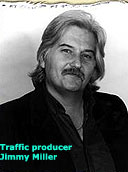
DM: Jimmy? Jimmy was great. He brought everything to the table. He
was just a great person. Great energy. Always up. Always positive.
Always laughing. He just made it so you felt comfortable just trying
anything and everything. That’s what made him a great producer.
I mean we cut Mr. Fantasy on four track and then the second
one was like ‘wow!’ on eight tracks’. (laughing)
RS: He worked on so many great albums.
DM: Yeah, sad about him.
RS:
I sometimes associate Mr. Fantasy with The Spencer Davis Group
album With Their New Face On. Did you ever hear With Their
New Face On?
DM: No, I haven’t heard that.
RS: You played on the original 45 version of the Spencer Davis hit
“Gimme Some Lovin”.
DM: No...well, I’m singing harmony with Steve on “Somebody
Help Me”. It’s just me and him singing, with me singing
the harmony on it. It’s a cool song actually. Jackie Edwards
was the writer.
RS: On “Somebody Help Me”?
DM: Yeah, “Somebody Help Me”. And then we were all singing
on the American version of “Gimme Some Lovin’”. And
we’re all singing on “I’m A Man”. Because that
was all the transition point where Steve was basically...And for three,
for four months I was basically a roadie for Spencer Davis. And one
night I had to get up and play being Steve because he didn’t
turn up. Spencer said, ‘hey you gotta get up and sing!’
I said, ‘what are you nuts? They’re gonna be throwing shit
at me all night. You want me to stand in for Steve Winwood?’
(laughter)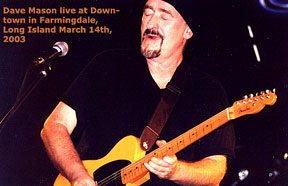
RS: Can you tell me what the first few lyrics are on “Gimme Some
Lovin’”?
DM: “Temperatures rising, my feet hit the floor, crazy people
knockin’ cause they wanna say more, Let me in baby, I don’t
know what you got, better take it easy, this place is hot”. (laughter)
RS: It was hard to make out the lyrics on that song.
DM: Well there’s a lot of that. I noticed that on alot of the
last stuff that Steve put out. I don’t understand a word he’s
saying.
RS: He sounded like a black singer.
DM: He’s always sounded like that. Like a young Ray Charles.
But it was so easy for him. He was so young. I mean I had to learn
how to sing. I had to learn how to clap on the two and the four. I
had to teach myself how to do all that stuff. It was like this kid
just opened his mouth...
RS: Steve is a magical singer.
DM: He had the natural ability to do it, which is really sad that
he’s just disappeared into the woodwork.
RS: And Steve’s living Upstate New York?
DM: He live in Nashville and England, I believe. That’s the last
I know of.
